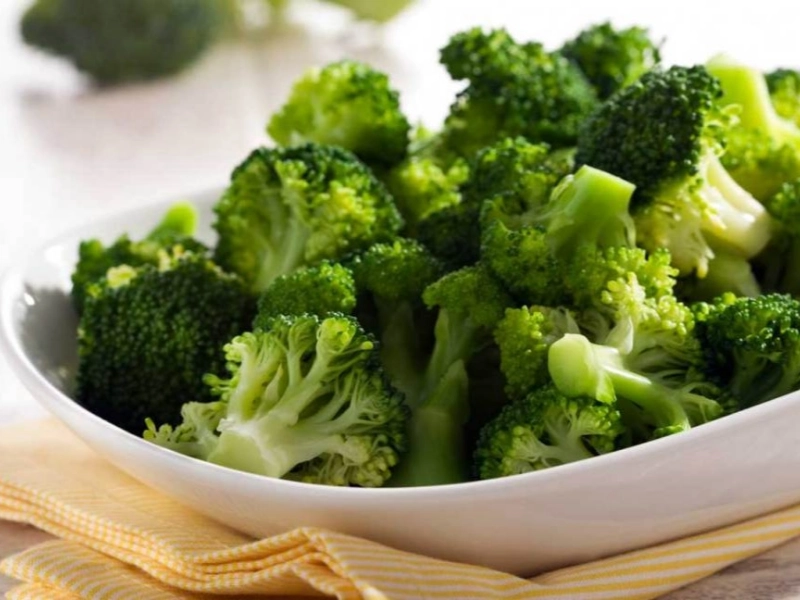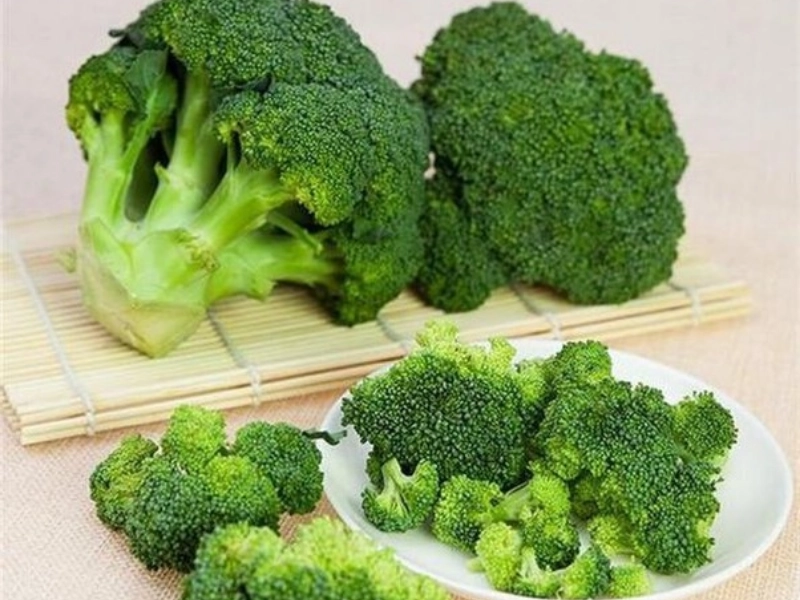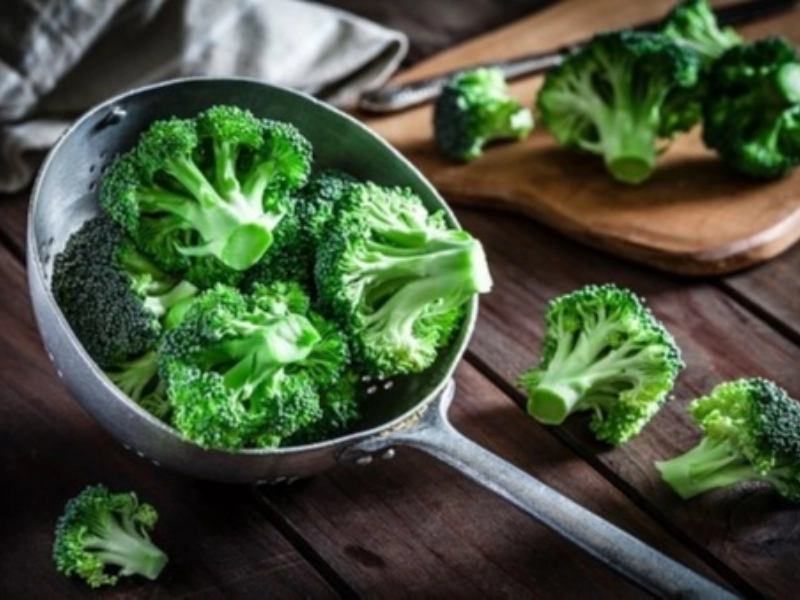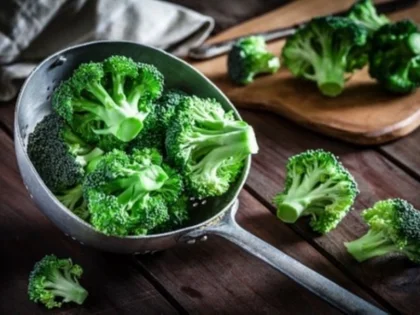Broccoli:The Vegetable That Supports Healthy Vision
Broccoli is a cruciferous vegetable that is nutrient-dense and vital to health. The presence of the carotenoids zeaxanthin and lutein has been linked to a lower incidence of age-related macular degeneration. Additionally, it contains vitamin A, which your body uses to produce beta-carotene. Try a simple green salad packed with nutrients that are beneficial for the eyes, or roast broccoli and sprinkle with olive oil.
Vitamin A

Vitamin C
 Broccoli is a low-calorie vegetable rich in antioxidants, vitamins, and minerals. Because of this, it's a fantastic option for anyone looking to get healthier.
Vitamin C must be obtained from food because the body cannot produce it. The vitamin is well renowned for its capacity to scavenge free radicals, which are erratic substances that can harm cells and cause illness.
Additionally, vitamin C is necessary for healthy eyes. It can guard against macular degeneration and cataracts while also assisting in maintaining a normal response to light. Broccoli is rich in vitamin A and contains carotenoids such as lutein and zeaxanthin. Moreover, it includes isothiocyanates and glucosinolates, which have anti-inflammatory and anti-cancer qualities.
Broccoli is a low-calorie vegetable rich in antioxidants, vitamins, and minerals. Because of this, it's a fantastic option for anyone looking to get healthier.
Vitamin C must be obtained from food because the body cannot produce it. The vitamin is well renowned for its capacity to scavenge free radicals, which are erratic substances that can harm cells and cause illness.
Additionally, vitamin C is necessary for healthy eyes. It can guard against macular degeneration and cataracts while also assisting in maintaining a normal response to light. Broccoli is rich in vitamin A and contains carotenoids such as lutein and zeaxanthin. Moreover, it includes isothiocyanates and glucosinolates, which have anti-inflammatory and anti-cancer qualities.
K-complex
 Broccoli is rich in vitamin K, which is an essential mineral for blood coagulation. Additionally, it has folate (vitamin B9), which is a crucial mineral for expectant mothers. Folate reduces the risk of heart disease and is essential for healthy cell and tissue growth.
Modulating specific inflammatory pathways in the body is one of the many health benefits of broccoli. Broccoli contains a chemical called sulforaphane, which is thought to help slow down the aging process by promoting the production of antioxidant genes. (37). Furthermore, it may halt the development of antibiotic-resistant germs. (38)*. * contains zeaxanthin and lutein, in addition to the rest of the Vision formula.
Broccoli is rich in vitamin K, which is an essential mineral for blood coagulation. Additionally, it has folate (vitamin B9), which is a crucial mineral for expectant mothers. Folate reduces the risk of heart disease and is essential for healthy cell and tissue growth.
Modulating specific inflammatory pathways in the body is one of the many health benefits of broccoli. Broccoli contains a chemical called sulforaphane, which is thought to help slow down the aging process by promoting the production of antioxidant genes. (37). Furthermore, it may halt the development of antibiotic-resistant germs. (38)*. * contains zeaxanthin and lutein, in addition to the rest of the Vision formula.
Vitamin E
 Broccoli, one of the most popular veggies, is tasty, nutrient-dense, and simple to cook. It can be prepared in a number of ways and is flavoring similar to cabbage. Additionally, it has beneficial vitamins and minerals that are necessary for optimal health.
Because of its antioxidant qualities, it helps shield the body from oxidative stress, which can harm cells and play a role in the development of chronic illnesses. It also contains high levels of iron, potassium, calcium, vitamin E, and folate.
Its near-fat-free status and capacity to lower high blood pressure are further advantages. Sulforaphane, a special plant chemical found in broccoli, aids in preventing or repairing the harm brought on by a high consumption of saturated and trans fats.
Broccoli, one of the most popular veggies, is tasty, nutrient-dense, and simple to cook. It can be prepared in a number of ways and is flavoring similar to cabbage. Additionally, it has beneficial vitamins and minerals that are necessary for optimal health.
Because of its antioxidant qualities, it helps shield the body from oxidative stress, which can harm cells and play a role in the development of chronic illnesses. It also contains high levels of iron, potassium, calcium, vitamin E, and folate.
Its near-fat-free status and capacity to lower high blood pressure are further advantages. Sulforaphane, a special plant chemical found in broccoli, aids in preventing or repairing the harm brought on by a high consumption of saturated and trans fats.
Lutein
 Broccoli, for example, is a natural source of lutein and zeaxanthin. These carotenoid-family antioxidants, which are concentrated in the retina (the center of the eye), aid in preventing age-related macular degeneration.
Zeaxanthin and lutein function as sunscreens for the eyes, shielding the retina's surface from UV rays that might cause damage. This is particularly important because exposure to sunlight and natural aging both increase the risk of AMD. Sulforaphane, a substance found in broccoli and many other cruciferous vegetables, has the potential to prevent this illness by scavenging free radicals. (17)
Broccoli, for example, is a natural source of lutein and zeaxanthin. These carotenoid-family antioxidants, which are concentrated in the retina (the center of the eye), aid in preventing age-related macular degeneration.
Zeaxanthin and lutein function as sunscreens for the eyes, shielding the retina's surface from UV rays that might cause damage. This is particularly important because exposure to sunlight and natural aging both increase the risk of AMD. Sulforaphane, a substance found in broccoli and many other cruciferous vegetables, has the potential to prevent this illness by scavenging free radicals. (17)
Zeaxanthin
 Broccoli contains lutein and zeaxanthin, which help lower oxidative stress and eye damage. They are believed to support positive vision and serve as filters for natural light.
Glucoraphanin, found in broccoli, is transformed by the body during digestion into the potent antioxidant sulforaphane. Sulforaphane may lower inflammation, raise cholesterol levels, and stave off chronic illnesses, according to research conducted on animals and in test tubes (5).
Broccoli is a fantastic source of vitamin C, even though most people only think of it in relation to oranges and strawberries. Half a cup of cooked broccoli supplies 84% of the daily required amount of vitamin C (3). Additionally, it provides folate (vitamin B9), which promotes cell health and is crucial for expectant mothers.
Broccoli contains lutein and zeaxanthin, which help lower oxidative stress and eye damage. They are believed to support positive vision and serve as filters for natural light.
Glucoraphanin, found in broccoli, is transformed by the body during digestion into the potent antioxidant sulforaphane. Sulforaphane may lower inflammation, raise cholesterol levels, and stave off chronic illnesses, according to research conducted on animals and in test tubes (5).
Broccoli is a fantastic source of vitamin C, even though most people only think of it in relation to oranges and strawberries. Half a cup of cooked broccoli supplies 84% of the daily required amount of vitamin C (3). Additionally, it provides folate (vitamin B9), which promotes cell health and is crucial for expectant mothers.









